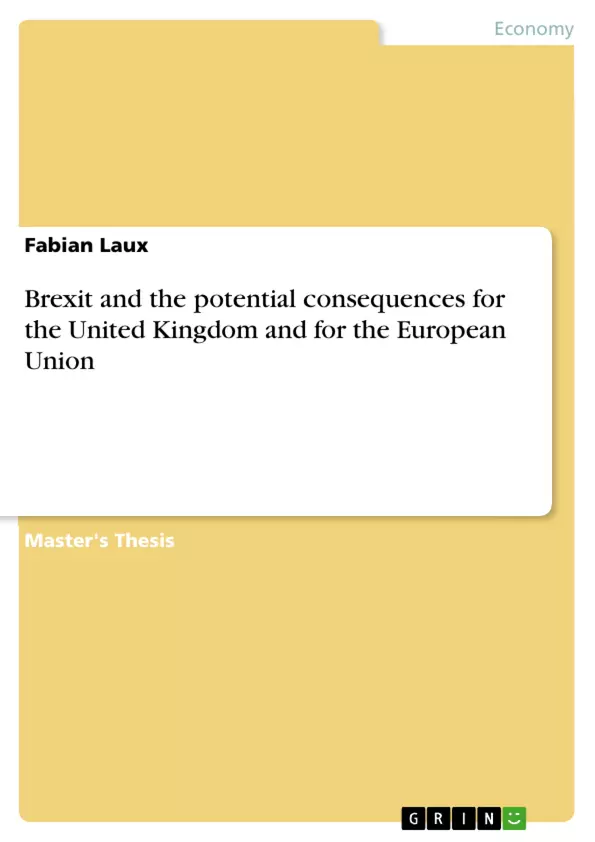Is a hard Brexit economically better, or should it be tried to retain the existing economic relations as much as possible? What economic and political impacts will the Brexit have on the United Kingdom and on the European Union? Finding the right answer to these questions is incredibly difficult, since it is still unclear how Britain and the EU will regulate their relations when Brexit takes place; hence, all critical evaluations of the consequences can only be based on assumptions.
By answering these questions, I will show that Brexit is most likely to harm the English and European economies. This is independent of whether a soft or a hard Brexit occur. However, it should be mentioned that at the time of writing this master thesis, the shape of the future EU-UK relations is unclear.
The United Kingdom (UK) joined the European Community in 1973. Only two years later, there was a first referendum in which the British voted on the membership in the Community. Sixty-four percent of voters used their voting rights, and 67 percent of these voters spoke in favour of remaining in the European Community. Since then the British have seen the European cooperation only as having added value in the single market, but the goal of a political union has remained foreign to them.
Due to the pressure of the UK Independence Party (UKIP), England’s right-wing political party led by Nigel Farage, on British Prime Minister David Cameron to hold a referendum on the membership of the EU, Cameron criticized in his speech at Bloomberg in 2013, among other things, the high level of debt or declining trust in Europe’s institutions. The British feel deceived by the European Union, as it draws more and more power and concludes new contracts without responding to the interests of the United Kingdom.
Many residents of Britain wonder, as Cameron reports, why they cannot have their only reason for entering the EU, namely, a common market. The main purpose of the European Union is to ensure wealth. The EU is only a means to achieve affluence, democracy and stability. Britain is characterized by independence and openness, as well as by the passion of its people to defend their sovereignty. Cameron announced that there will be another referendum on the disposition of the UK in the EU.
Inhaltsverzeichnis (Table of Contents)
- Introduction
- Background Information
- Structure of This Work
- EU Referendum
- Who Has Voted
- Article 50 of the Treaty on the European Union
- Differentiation between Soft and Hard Brexit
- Soft Brexit
- Hard Brexit
- Advantages and Disadvantages
- Current Status of the Negotiations
- Political Implications
- Fear of Further Withdrawals
- Consequences for British Regions
- Economic Consequences
- Monetary System
- The Brexit Bill
- Banking and Financial Sectors
- Migration and the Labour Market
- Trade
- Trade in Goods and Services
- Trade Restrictions
- Tariffs
- Non-Tariff Barriers
- Welfare Effects
- Review of the Literature
- My Structural Gravity Model
- Data
- Results
- Conclusions
Zielsetzung und Themenschwerpunkte (Objectives and Key Themes)
This master thesis explores the potential consequences of Brexit for both the United Kingdom and the European Union. It examines the different Brexit models and their potential impacts on the economy, politics, and trade relations between the two entities.
- The impact of Brexit on the UK and EU economies
- The political implications of Brexit, including potential consequences for other EU member states
- The effects of Brexit on trade between the UK and EU
- The implications of Brexit for migration and the labor market
- The welfare effects of Brexit
Zusammenfassung der Kapitel (Chapter Summaries)
- Introduction: This chapter provides background information on Brexit and outlines the structure of the thesis.
- EU Referendum: This chapter explores the UK's decision to leave the EU, focusing on the voting process and the implications of Article 50 of the Treaty on European Union.
- Differentiation between Soft and Hard Brexit: This chapter examines the different models for Brexit, including the potential benefits and drawbacks of each model.
- Current Status of the Negotiations: This chapter provides an overview of the current state of the negotiations between the UK and EU.
- Political Implications: This chapter explores the potential political consequences of Brexit, including the fear of further withdrawals from the EU and the impact on British regions.
- Economic Consequences: This chapter analyzes the potential economic consequences of Brexit, focusing on the monetary system, migration and the labor market.
- Trade: This chapter examines the potential effects of Brexit on trade between the UK and EU, including the implications of tariffs and non-tariff barriers.
- Welfare Effects: This chapter explores the potential welfare effects of Brexit using a structural gravity model.
Schlüsselwörter (Keywords)
This master thesis focuses on the implications of Brexit for both the UK and the EU. Key areas of analysis include the impact of Brexit on trade, the economic consequences, the political ramifications, and the welfare effects. Specific topics explored include the differentiation between soft and hard Brexit, the negotiation process, the monetary system, migration and the labor market, and the role of tariffs and non-tariff barriers.
- Citation du texte
- Fabian Laux (Auteur), 2019, Brexit and the potential consequences for the United Kingdom and for the European Union, Munich, GRIN Verlag, https://www.grin.com/document/463876



